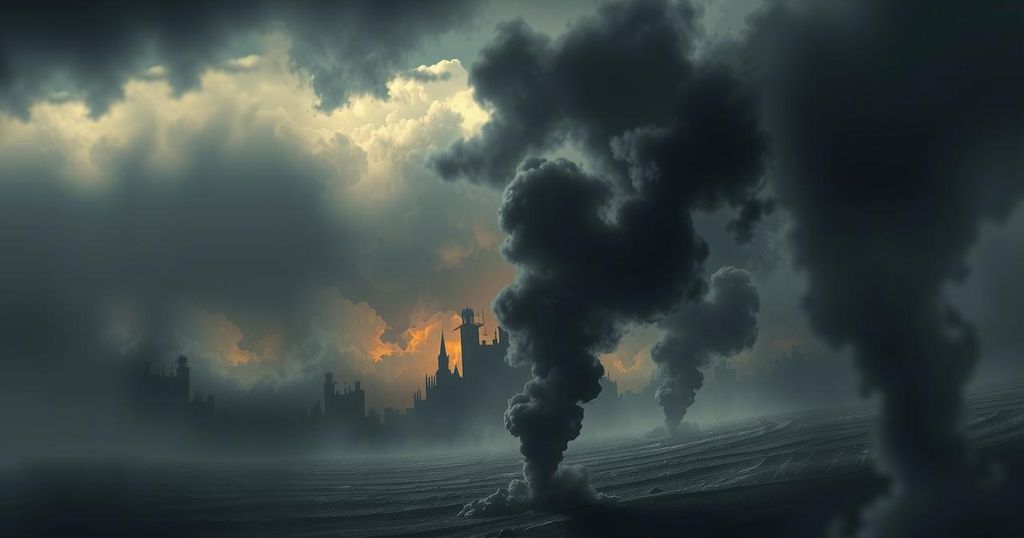Israel Intensifies Military Campaign Against Iran, Promises Severe Retaliation

Israel intensifies military operations against Iran, resulting in significant casualties and destruction. Prime Minister Netanyahu claims strikes have delayed Iran’s nuclear program by years. The conflict escalates following Iranian missile attacks on Israel and a cancellation of diplomatic talks. Rising crude oil prices and fears of wider confrontation linger as tensions grow.
Israel has escalated its military campaign against Iran for the second consecutive day, with Prime Minister Benjamin Netanyahu stating that their actions will intensify. Israeli forces launched a surprise strike, reportedly taking out crucial figures in Iran’s military command. They also targeted the oil and gas sector, igniting a fire at a gas field, marking a significant shift in their airstrikes. Netanyahu declared that these attacks could stall Iran’s nuclear ambitions by years, disregarding international calls for restraint.
The ramifications of the conflict have been devastating. Iranian officials claim that around 60 fatalities were reported from an attack on a housing complex, including 29 children. Israel, on its end, has stated it has engaged over 150 sites within Iranian territory. The tension heightened Friday night when Iran retaliated, launching missiles at Israeli positions, which resulted in three fatalities. The air raid sirens echoed through Israel as defensive responses attempted to intercept incoming projectiles.
In what seems to enhance the geopolitical stakes, US President Donald Trump supported Israel’s military efforts and cautioned Iran regarding the potential for much worse to come. He proposed that Tehran could still avert the ongoing attacks if it agrees to significantly curb its nuclear program. However, Oman confirmed that previously scheduled talks between Washington and Tehran have been canceled. Iran’s Foreign Minister characterized ongoing negotiations as unjustifiable while Israel conducts its military operations.
Israel’s assault has now raised concerns about the stability of the global oil markets, with reports of disruptions in Iranian energy production as crude prices surged. Notably, a blaze at the South Pars gas field was reported, following the strikes on Iran’s energy infrastructure. This has placed pressure on oil production and exports, subsequently sending crude prices up by approximately 7 percent. In a response, an Iranian general hinted at the possibility of closing the Strait of Hormuz, a critical maritime route for oil tankers.
The conflict has prompted Israel to rally Iranians to rebel against their current governance, announcing that this military campaign could span weeks. Israeli Defense Minister Israel Katz issued a stark warning regarding the consequences for Iran’s leadership if missile attacks continue against Israel. As Iran retaliated with a volley of missiles, concerns grew of a larger regional conflict.
In the wake of ongoing strikes, panic erupted across Israeli cities, with multiple missiles reportedly dodging air defenses and inflicting casualties. Residents in cities like Tel Aviv experienced severe anxiety as air raid sirens prompted emergency protocols. One Tel Aviv resident reflected on the heightened caution among citizens, emphasizing the uncertainty permeating the atmosphere as they brace for potential future assaults.
Meanwhile, the aftermath of Israel’s strikes in Iran has left extensive damage, with residential buildings reduced to rubble and numerous casualties among civilians. Iran has condemned the attacks, asserting that the strikes led to a significant death toll, including children, with considerable destruction to key infrastructure linked to their nuclear ambitions. An Israeli military source claimed substantial damage had been inflicted on Iranian nuclear facilities, although operations targeting the Fordow uranium enrichment site have yet to occur.
As tensions between Israel and Iran escalate dramatically, casualties continue to mount, with both sides intensifying military actions. Israel’s aggressive campaign has drawn international attention, especially regarding its implications for regional stability and global oil markets. Iranian officials denounce the perceived aggression, and retaliatory actions have initiated fears of a broader conflict. With diplomatic avenues seemingly closed for now, the situation remains precarious as both nations navigate through this turbulent period.
Original Source: www.euractiv.com








